You Fool!
I’m not looking to start a fight here. When The Genji and the Heike Clans was released in Japanese arcades by Namco in 1986 as Genpei Tōma Den, it was generally well-respected. However, here at the Destructoid Institute of Critiquing Kusoge (DICK), we have a saying: If it walks like Kusoge, quacks like Kusoge, and smells like Kusoge, it’s definitely Kusoge (crap game). So, are you going to take the word of Japan, the experts on Kusoge? Or would you rather be daring and listen to the brash, upstart DICK?
I don’t know why I’m so hesitant to talk about The Genji and the Heike Clans with the perspective of it being a bad game. If someone trots in with Altered Beast, I’d be the first one to stand up and tell them how much it sucks. It’s perhaps because, culturally, I understand Altered Beast. The Genji and the Heike Clans shows me that I understand Japan as much as I do deep space. I may think I know a lot, but then I see all sorts of things I don’t understand.
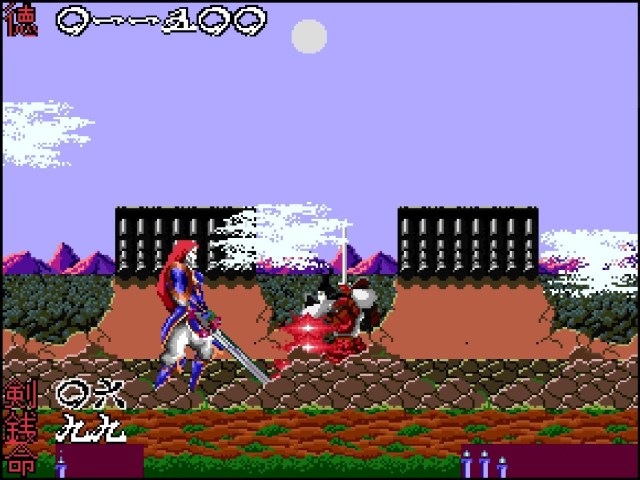
Big Bushido
You play as the resurrected Taira no Kagekiyo, and you’re kind of pissed off that your clan lost the Genpei War, so you’re off to take Minamoto no Yoritomo, the first Shogun. It’s all right. This isn’t just revenge; the guy is more evil than the history books let on, so there are demons and stuff. Kagekiyo must travel across feudal Japan to Kamakura to get their revenge.
The Genji and the Heike Clans boasts three different modes of play. There’s side-scroller platforming, “big mode,” and a top-down view. You’re most often going to find yourself in the normal side-scroller view, with the other two peppered in.
Big mode presents Kagekiyo in huge detail as he traipses across the screen. It reminds me of my old nemesis Predator on the NES. It might actually have been influenced by The Genji and the Heike Clans, since I think it called it big mode there, as well. They both present the protagonist as impractically big, showing off some nice detail but not moving much room for maneuvering. As such, it’s as clumsy as a newborn deer on an escalator. It gets even funnier when Kagekiyo picks up a scroll and just starts swinging his sword around like a windmill.
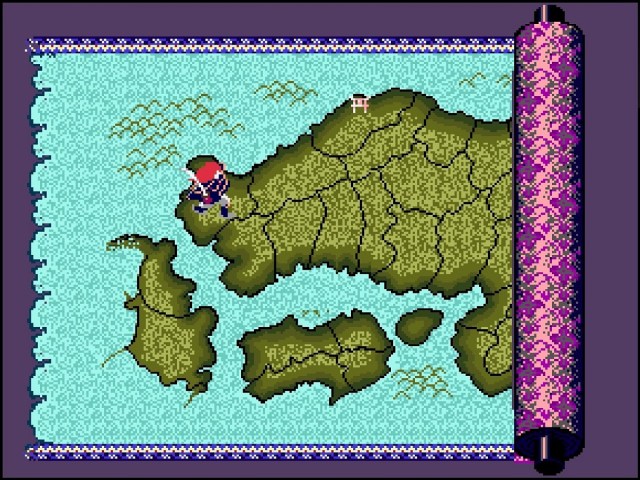
Orgy in a tumble dryer
None of the modes work particularly well. The Genji and the Heike Clans’ approach to enemy placement is to just stick a bunch of spawners around and have them dumping bad guys on you. You take so much unavoidable damage as you make your way to the exit and the hit detection is just terrible, so it’s more chaotic than an orgy in a tumble dryer.
The worst part is the platforming. There are a lot of moving platforms that you have to traverse, and Kagekiyo just doesn’t stick to them. If there’s one that goes up and down, he has trouble jumping because he’s technically falling the whole time. Whenever a platform moves horizontally, he doesn’t move with it, which is just so, so strange. If you land on one, you have to physically keep moving with it to stay on top, otherwise, it just slides out from underneath Kagekiyo.
If you fall in a hole, you don’t die instantly. You fall into Yomi, where you then have to fight your way to a circle of crates. You open the crates, and you’ll either be killed instantly or respawned at the last level you were on. I’d rather it just kill me outright. This probably made more sense in the arcade, where luck of the draw would spare you a quarter, but playing it on a console just highlights it as a nuisance.
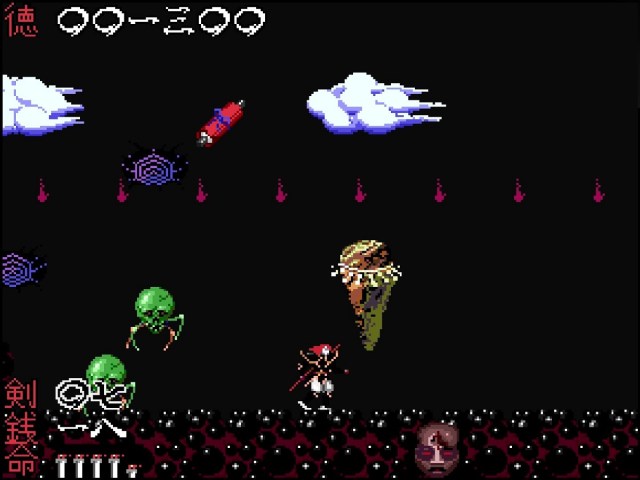
One last Heike
I first learned about The Genji and the Heike Clans from Game Centre CX. The host, Shinya Arino, played the PC-Engine version, which is considered to be a pretty faithful conversion of the game. He failed to clear it so hard.
Part of the problem is that, after you hit the mid-point of Kyoto, you start back there whenever you die, rather than the last level you made it to. He came nowhere near Kamakura, and having played it now, I can absolutely understand why. It’s brutal, and that is completely uncalled for.
For starters, it has a mystifying health system. It’s measured in candles that get burnt down, and you can increase the maximum number of them. However, you get a certain number restored each time you start a new level, but I couldn’t tell you why it gives you that amount. I’m also not totally clear on how much each pick-up gives you in terms of extra health. Generally, this was just a game of trying to blast through a level as quickly as possible before I died.
Your sword also has health, and this gets depleted by hitting “hard” enemies. What constitutes “hard” is less clear. Skulls are pretty soft. Caves that are clearly made of stone don’t weaken your sword. But when Benkei blocks your attack, that’s hard. What a block looks like, that’s another matter. However, there’s a lot of importance put around strengthening your sword. Not only does this make it more powerful, but if your sword gets depleted, it gets bent and can’t do much damage at all. It’s just… ugh, it’s so dumb.
Part of Arino’s strategy was to just focus on building up his sword gauge. This makes bosses a lot easier, but you can also lose your entire gauge by falling down a hole and getting a bad pull in the lottery. So, really, I’m not sure if that actually makes the game any more beatable. It’s just so slapdash.
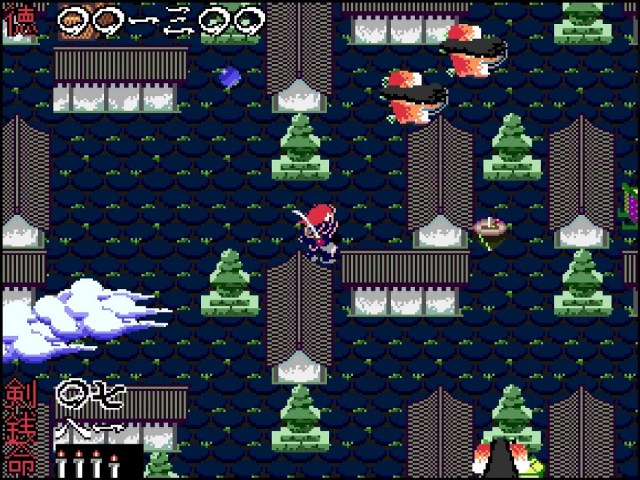
Culture shock
I think a lot of the praise toward The Genji and the Heike Clans is aimed at its graphics and sound. There are a lot of voice samples mixed in there. For a 1986 release, yeah, it looks pretty good. I just can’t explain why it plays so badly. Castlevania also came out in 1986, and it had figured out platforming just fine.
It does have a unique visual style, I’ll give it that. It draws heavily from Japanese history and folklore. You’d need to be pretty deeply familiar with both of those things to understand half the references found mixed in here. Even still, it’s pretty trippy and nightmarish. Especially when a towering Minamoto no Yoritomo pops up in the background and smacks you with his powerful spoon.
There are also multiple routes you can take to Kamakura, which kind of makes the fact that it changes the rules of continuing past the game’s mid-point. It’s still going to suck the quarters out of kids, and there is a decent amount of replay value that comes from plumbing it for secrets, so why go to the extent of making it impossibly difficult. It just makes The Genji and the Heike Clans feel even more slap-dash.
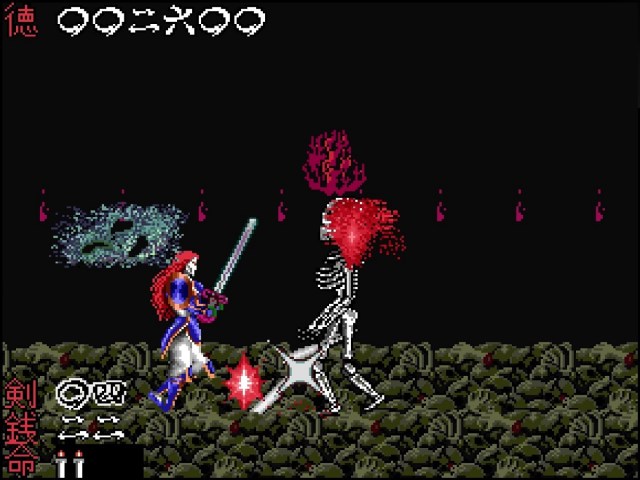
Indispensible crap
It first got released over here as an unusual inclusion in Namco Museum Vol. 4 on PS1. It was rather perplexing to contemporary critics at the time. However, nowadays, you can get it on PlayStation and Switch platforms as part of Hamster’s terrific Arcade Archives series. There was also a sequel released on PC-Engine/Turbografx-16 called Samurai-Ghost. It only included big mode, and I’ll have to report back on that when I finally pick up a PC-Engine. I’m not paying the hundreds of dollars for a TG16 copy.
As I said in the beginning, The Genji and the Heike Clans was well-received when it came out in Japan. I think this has to do with the palate of Japanese arcade gamers at the time that just didn’t translate in the West as we recovered from the Great Video Game Crash of 1983. Playing it today as a North American, though. Oof. It is just so bad.
But it’s also the good kind of bad. It’s an absolutely loveable bit of suffering to endure. It’s this painful mess of poor execution and culture shock. I sort of love it.
For previous Weekly Kusoge, check this link!






Published: Jul 3, 2023 04:00 pm